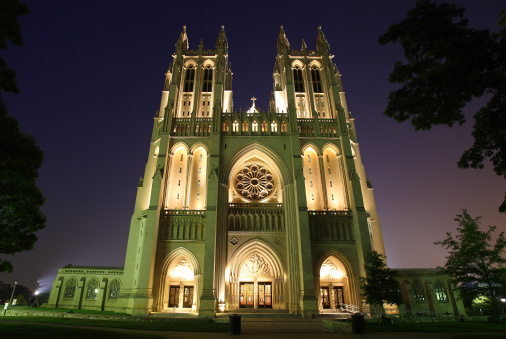Religious leaders usually shy away from public condemnation of individuals, but for the prelates who lead the Washington National Cathedral, Donald Trump has gone too far and said too much.
In a rare and strongly worded statement, they ask: “After two years of President Trump’s words and actions, when will Americans have enough?”
The statement was issued Tuesday while politically inclined Americans were focused on the first round of the second Democratic presidential debate and so drew little attention at the time.
But by Wednesday morning, the significance of such words coming from three of the country’s most eminent religious leaders was vividly clear: it’s a call to decency, directed at both Trump and the entire nation.
“We have come to accept a level of insult and abuse in political discourse that violates each person’s sacred identity as a child of God,” the statement reads. “We have come to accept as normal a steady stream of language and accusations coming from the highest office in the land that plays to racist elements in society.”
The statement was issued by the Right Rev. Mariann Edgar Budde, bishop of the Episcopal Diocese of Washington; the Very Rev. Randolph Marshall Hollerith, dean of the National Cathedral; and the Rev. Canon Kelly Brown Douglas, the Cathedral’s canon theologian.
Trump’s recent insults aimed at Rep. Elijah Cummings (D-MD), a lifelong civil rights crusader; at Baltimore, the city Cummings represents, and at the four congresswomen of color known as the Squad, “crossed another threshold,” the church leaders said, adding that “words matter. And Mr. Trump’s words are dangerous.”
“When such violent dehumanizing words come from the President of the United States, they are a clarion call, and give cover, to white supremacists,” the statement says.
“As leaders of faith who believe in the sacredness of every single human being, the time for silence is over,” it says. “We must boldly stand witness against the bigotry, hatred, intolerance, and xenophobia that is hurled at us, especially when it comes from the highest offices of this nation. We must say that this will not be tolerated.”
The statement noted another moment when Americans were confronted with an amoral political zealot: Sen. Joseph McCarthy, who in an anti-communist frenzy in the 1950’s “stoked the fears of an anxious nation with lies; destroyed the careers of countless Americans; and bullied into submissive silence anyone who dared criticize him.”
McCarthy was finally faced down, on live television, by Joseph Welch, an attorney for the U.S. Army, who said: “Until this moment, Senator, I think I never really gauged your cruelty or your recklessness. … You have done enough. Have you no sense of decency?”
And the National Cathedral leaders now ask — of all Americans — “When does silence become complicity? What will it take for us all to say, with one voice, that we have had enough? The question is less about the president’s sense of decency, but of ours.”



